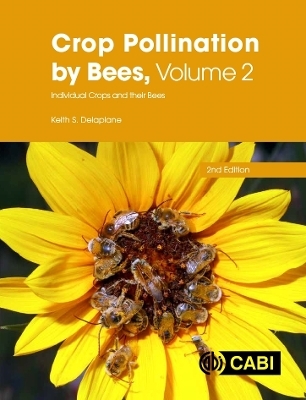
Crop Pollination by Bees, Volume 2
CABI Publishing (Verlag)
978-1-78639-352-4 (ISBN)
Since the second half of the 20th Century, our agricultural bee pollinators have faced mounting threats from ecological disturbance and pan-global movement of pathogens and parasites. At the same time, the area of pollinator-dependent crops is increasing globally with no end in sight. Never before has so much been asked of our finite pool of bee pollinators. This book not only explores the evolutionary and ecologic bases of these dynamics, it translates this knowledge into practical research-based guidance for using bees to pollinate crops. It emphasizes conserving wild bee populations as well as culturing honey bees, bumble bees, and managed solitary bees. To cover such a range of biology, theory, and practice from the perspectives of both the pollinator and the crop, the book is divided into two volumes. Volume 1 focuses on bees, their biology, coevolution with flowering plants, foraging ecology and management, and gives practical ways to increase bee abundance and pollinating performance on the farm. Volume 2 (this volume) focuses on crops, with chapters addressing crop-specific requirements and bee pollination management recommendations. Both volumes are essential reading for farmers, horticulturists and gardeners, researchers and professionals working in insect ecology and conservation, and students of entomology and crop protection.
Keith Delaplane is a professor at the University of Georgia where he has responsibilities in research, graduate student advisement, and public outreach in pollinator management, social evolution, pathology, and conservation. He has won numerous awards including the highest honor for outreach faculty at the University of Georgia, a named professorship, the Walter B. Hill Fellow. In 2014 HRH Queen Elizabeth II recognized him as an honorary Member of the British Empire (MBE) for his research and education efforts throughout the U.K.
Chapter 1: Pesticides and Crop Pollination by Bees Chapter 2: Alfalfa (Lucerne) Seed Chapter 3: Allspice (Pimento) Chapter 4: Almond Chapter 5: Apple Chapter 6: Apricot Chapter 7: Asparagus Seed Chapter 8: Avocado Chapter 9: Bean, Faba, Broad Chapter 10: Bean, Field, Hyacinth, Indian, Lablab Chapter 11: Bean, Jack, Horse, Feijão de Porco, Swordbean Chapter 12: Bean, Soy, Soybean Chapter 13: Black Currant, Red Currant Chapter 14: Blackberry Chapter 15: Blueberry Chapter 16: Brazil Nut Chapter 17: Buckwheat Chapter 18: Cabbage, Cauliflower, and other Crucifer Seed Chapter 19: Cantaloupe, Honeydew, Melon, Muskmelon Chapter 20: Cardamom Chapter 21: Carrot Chapter 22: Cashew Chapter 23: Clover Seed (Alsike) Chapter 24: Clover Seed (Crimson) Chapter 25: Clover Seed (Red) Chapter 26: Clover Seed (White, Dutch, Ladino) Chapter 27: Clover Seed (Sweet) Chapter 28: Cocoa Chapter 29: Coffee Chapter 30: Cranberry Chapter 31: Cucumber Chapter 32: Feijoa Chapter 33: Guava Chapter 34: Kiwifruit Chapter 35: Loquat Chapter 36: Macadamia Chapter 37: Mango Chapter 38: Onion Seed Chapter 39: Passion fruit Chapter 40: Peach and Nectarine Chapter 41: Pear Chapter 42: Plum and Prune Chapter 43: Pumpkin, Squash Chapter 44: Rapeseed, Canola Chapter 45: Raspberry Chapter 46: Rosehips Chapter 47: Shea Nut Chapter 48: Star fruit Chapter 49: Strawberry Chapter 50: Sunflower Chapter 51: Sweet and Sour Cherry Chapter 52: Tomato Chapter 53: Vanilla Chapter 54: Watermelon
| Erscheinungsdatum | 07.10.2023 |
|---|---|
| Verlagsort | Wallingford |
| Sprache | englisch |
| Maße | 189 x 246 mm |
| Gewicht | 876 g |
| Themenwelt | Naturwissenschaften ► Biologie ► Zoologie |
| Weitere Fachgebiete ► Land- / Forstwirtschaft / Fischerei | |
| ISBN-10 | 1-78639-352-2 / 1786393522 |
| ISBN-13 | 978-1-78639-352-4 / 9781786393524 |
| Zustand | Neuware |
| Informationen gemäß Produktsicherheitsverordnung (GPSR) | |
| Haben Sie eine Frage zum Produkt? |
aus dem Bereich


